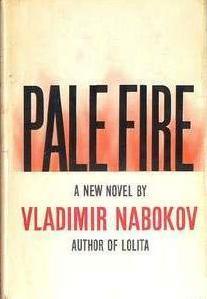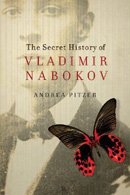Terror’s ghosts: Nabokov’s Pale Fire and the return from the Gulag
Heroes returning home in disguise have been around since the days of Homer. For just as long, these heroes have been recognized despite their masks. Coming back from the Trojan War dressed as a beggar, Odysseus found that his dog and childhood nurse could see through his deception.
But what about events that transform survivors beyond recognition?
The collapse of recognition runs through both fiction and nonfiction about prisoners returning from the Soviet Gulag. Zeks released in the 1950s after years of being mangled by a state determined to reshape society found themselves unknown and unknowable. Russians left behind at home, who might once have understood the prisoners, had also been transformed in the meantime—often through complicity required to survive the system.
At the heart of The Secret History of Vladimir Nabokov is the idea that Pale Fire‘s delusional narrator, who imagines himself the exiled king of Zembla, has a story and a past bound up deeply with the Gulag. But even absent the history explored in the book, Pale Fire parallels Gulag memoirs in multiple ways, sharing themes of ghostliness, shattered recognition, impostors, and fantastic stories of escape.
Recognition obliterated
In Journey Into the Whirlwind, Evgenia Ginzburg’s memoir of an eighteen-year Gulag sentence and exile, a mother mistakes her living son for her dead one. Equally estranged from herself, at one point in a labor camp, she recognizes her reflection only by its resemblance to her mother.
Vasily Grossman’s Forever Flowing recounts the return of Ivan Grigoryevich after thirty years in prison to find that his remaining family sees him as an “alien, spiteful, hostile” presence. They want to reunite with him but fear his judgment against them for compromises they have made. In a beautifully inelegant passage, they tell Ivan Grigoryevich what happened to his fiancée, whom he mourned for dead in the camps:
“Did she write you?”
“My last letter from her was eighteen years ago.”
“Yes, yes. She is married. Her husband is a chemical physicist, you know, engaged in all that nuclear business. They live in Leningrad—can you imagine it?—in the very same apartment where she used to live with her family. We usually run into her on vacation, in the fall. She always used to ask about you, but since the war, to tell the truth, she has stopped.”
Ivan Grigoryevich goes back to Leningrad and stands beneath his former lover’s window, but feels farther from her than he did when barbed wire separated them. In a place where those who vanished come back to haunt the living and are themselves haunted in return, it can be hard to know which characters are ghosts.
In “A Parable of Misrecognition” (paid) from The Russian Review, Alexander Etkind brings together the work of Ginzburg and Grossman to show how obliterating recognition revealed the horror of the camps and the distance between the prisoners and those who remained at home. He also makes an odd couple out of Freud and Soviet Premier Nikita Khrushchev in order to explain the ghostliness of Gulag returnees as a kind of doubled repression:
In 1956, Nikita Khrushchev used the concept of “unjustified repressions” as the euphemism for mass murders, arrests, and deportations. Millions of the surviving victims of these “repressions” were coming back to their homes after years or decades of separation from their families. In Sigmund Freud’s famous definition of 1919, “something which is secretly familiar, which has undergone repression and then returned from it,” was the uncanny. The two readings of the term “repression(s),” Freud’s and Khrushchev’s, are intimately correlated. When the repressed returned, these long-mourned, secretly familiar, inadvertently forgotten people were perceived as the uncanny.
Pale Fire and recognition
Charles Kinbote, the mad narrator of Nabokov’s 1962 novel Pale Fire, tells stories of a revolution that resulted in a totalitarian state. He is imprisoned but through spectacular, unbelievable means, escapes and makes his way to the West. By the time the book opens, he has lost his identity and has become unrecognizable even to himself, taking refuge in the delusion that he is the exiled king of the land of Zembla.
Notions of repression and the uncanny pervade Pale Fire—Kinbote believes locked doors become unlocked overnight, that someone has tied a white silk bow on the cat while he lay sleepless in his rented house. He hears approaching footsteps and calls the police, who find nothing amiss.
In a key passage in the book that takes place just after “an eerie note” passes through the room, an American history professor seems to recognize Kinbote, identifying him as not Zemblan but Russian, and his name as not Kinbote but something like Botkin.
 Kinbote insists that the professor is mistaken, but in an interview published after the book came out, Nabokov made clear that Kinbote had actually been recognized, that he was “not an ex-King of Zembla nor is he Professor Kinbote. He is Professor Botkin, or Botkine, a Russian and a madman.” Once the reader understands that Kinbote is Russian, his stories of escape from a police state become less outrageous and more unsettling.
Kinbote insists that the professor is mistaken, but in an interview published after the book came out, Nabokov made clear that Kinbote had actually been recognized, that he was “not an ex-King of Zembla nor is he Professor Kinbote. He is Professor Botkin, or Botkine, a Russian and a madman.” Once the reader understands that Kinbote is Russian, his stories of escape from a police state become less outrageous and more unsettling.
What we might call a “reverse Odysseus”—a normal person pretending to greatness—is hardly unique to Pale Fire. in The Gulag Archipelago, Solzhenitsyn shares a cell with a young man imprisoned for announcing that he would soon be crowned Tsar of Russia. And Etkind explains how impostors “played an unusually large role in Russian and Soviet history and memory.”
As Etkind describes it, these stories show that the only way for prisoners to stay alive in the Gulag was through losing their identity, “through not remaining themselves.” As an escapee his real or imagined imprisonment and an exile, Kinbote is likewise doubly unrecognizable, understood perhaps only by his friend John Shade, who says that “I think I guessed your secret quite some time ago.”
In Lectures on Literature, Nabokov imagined thousands of fellow dreamers trapped by the “terror, stupidity, and barbed wire” of communism or a police state—dreamers who would not surrender their imagination but would keep fidelity with the irrational and illogical in the midst of “the darkest and most dazzling hours of physical danger, pain, dust, death.” In embracing his madness, Kinbote rejects the power of whatever has obliterated his past by creating his own untouchable interior world. As his friend John Shade suggests, one who “deliberately peels off a drab and unhappy past and replaces it with a brilliant invention” may be more poet than lunatic.
The death of Mandelstam
If Kinbote is meant (as I think he is) to bear witness to the dead of the Gulag in some way, what could such a person—a survivor beyond recognition even to himself—say?
Etkind’s look at recognition also recounts how, after the death of poet Osip Mandelstam* in the Great Purge years after he had written a verse critical of Stalin, his wife Nadezhda wanted to know exactly what had happened to him. At first, she could not accept his loss. But eventually, naming the concept of recognition as her husband’s defining interest, she dedicated herself to understanding the last days of his life:
In her efforts to learn the fate of her husband, Mandelstam found and interviewed several ex-prisoners who said that they met him in the camps, but their stories were not credible. One of them was the poet Iurii Kazarnovskii (1904–56?), a soon-to-be dead who survived and bore witness. Nadezhda Mandelstam’s words about Kazarnovskii’s stories of Osip’s death are exemplary critical: “his memory turned into a huge soured pancake, where the facts and realities of living in the camp were baked along with fantasies, legends, and mere fiction.”… Mandelstam believed that this pancake-like cognition, which was not structured by time and space and did not distinguish between fact and fiction, was characteristic for many (“almost all”) survivors whom she happened to know. She called this post-camp condition “memory disease.”
Etkin explains that Nadezhda Mandelstam “wanted facts, actually one single fact: “What is being done to you ‘there’?” But the details of the last days of her husband were beyond recall. Under duress, prisoners’ pasts were shed beyond recognition, and the only reliable testimony about the dead became their absence from the world of the living.
Those who return have the stories they invent in order to survive. As with Kinbote and the readers of Pale Fire, all that Kazarnovskii could tell Nadezdha Mandelstam about what had transpired were half-true stories and “his own miraculous survivals.”
———
*Mandelstam had attended Vladimir Nabokov’s high school in St. Petersburg, though the two writers were not there at the same time.
[A tip of the hat to Matthew Roth for bringing the Etkind paper to my attention.]
